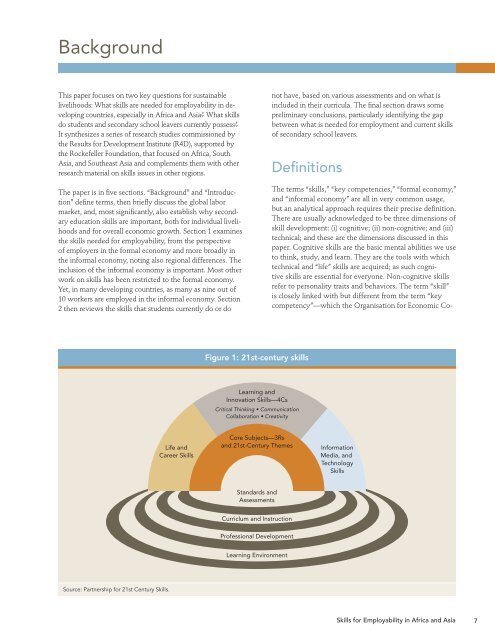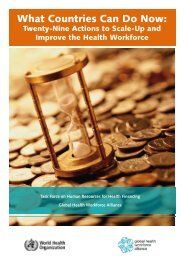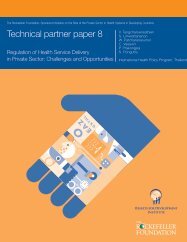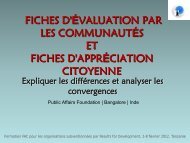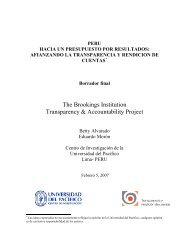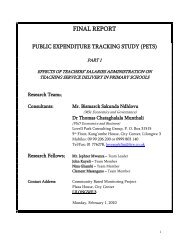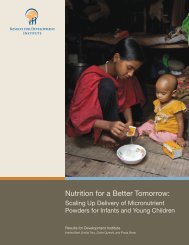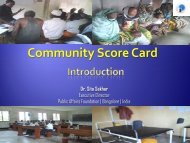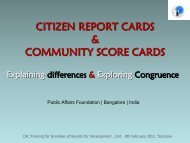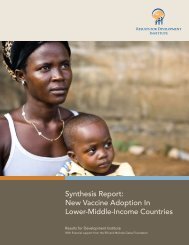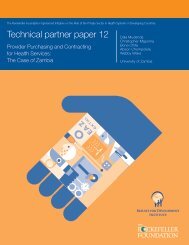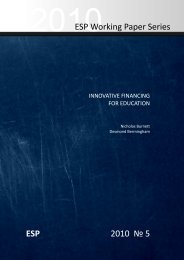Innovative Secondary Education For Skills Enhancement
Innovative Secondary Education For Skills Enhancement
Innovative Secondary Education For Skills Enhancement
You also want an ePaper? Increase the reach of your titles
YUMPU automatically turns print PDFs into web optimized ePapers that Google loves.
Background<br />
This paper focuses on two key questions for sustainable<br />
livelihoods: What skills are needed for employability in developing<br />
countries, especially in Africa and Asia What skills<br />
do students and secondary school leavers currently possess<br />
It synthesizes a series of research studies commissioned by<br />
the Results for Development Institute (R4D), supported by<br />
the Rockefeller Foundation, that focused on Africa, South<br />
Asia, and Southeast Asia and complements them with other<br />
research material on skills issues in other regions.<br />
The paper is in five sections. “Background” and “Introduction”<br />
define terms, then briefly discuss the global labor<br />
market, and, most significantly, also establish why secondary<br />
education skills are important, both for individual livelihoods<br />
and for overall economic growth. Section 1 examines<br />
the skills needed for employability, from the perspective<br />
of employers in the formal economy and more broadly in<br />
the informal economy, noting also regional differences. The<br />
inclusion of the informal economy is important. Most other<br />
work on skills has been restricted to the formal economy.<br />
Yet, in many developing countries, as many as nine out of<br />
10 workers are employed in the informal economy. Section<br />
2 then reviews the skills that students currently do or do<br />
not have, based on various assessments and on what is<br />
included in their curricula. The final section draws some<br />
preliminary conclusions, particularly identifying the gap<br />
between what is needed for employment and current skills<br />
of secondary school leavers.<br />
Definitions<br />
The terms “skills,” “key competencies,” “formal economy,”<br />
and “informal economy” are all in very common usage,<br />
but an analytical approach requires their precise definition.<br />
There are usually acknowledged to be three dimensions of<br />
skill development: (i) cognitive; (ii) non-cognitive; and (iii)<br />
technical; and these are the dimensions discussed in this<br />
paper. Cognitive skills are the basic mental abilities we use<br />
to think, study, and learn. They are the tools with which<br />
technical and “life” skills are acquired; as such cognitive<br />
skills are essential for everyone. Non-cognitive skills<br />
refer to personality traits and behaviors. The term “skill”<br />
is closely linked with but different from the term “key<br />
competency”—which the Organisation for Economic Co-<br />
Figure 1: 21st-century skills<br />
Learning and<br />
Innovation <strong>Skills</strong>—4Cs<br />
Critical Thinking • Communication<br />
Collaboration • Creativity<br />
Life and<br />
Career <strong>Skills</strong><br />
Core Subjects—3Rs<br />
and 21st-Century Themes<br />
Information<br />
Media, and<br />
Technology<br />
<strong>Skills</strong><br />
Standards and<br />
Assessments<br />
Curriclum and Instruction<br />
Professional Development<br />
Learning Environment<br />
Source: Partnership for 21st Century <strong>Skills</strong>.<br />
<strong>Skills</strong> for Employability in Africa and Asia 7


